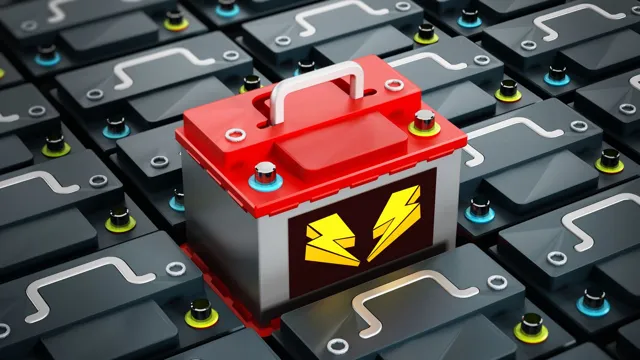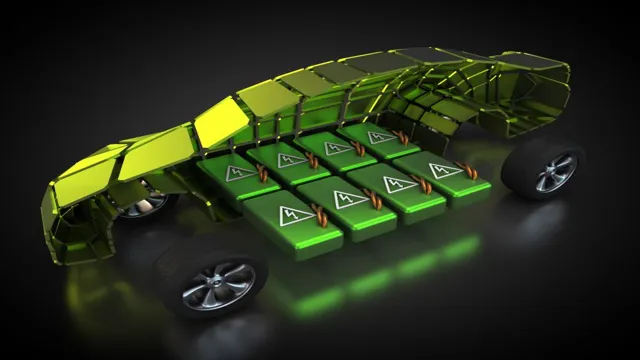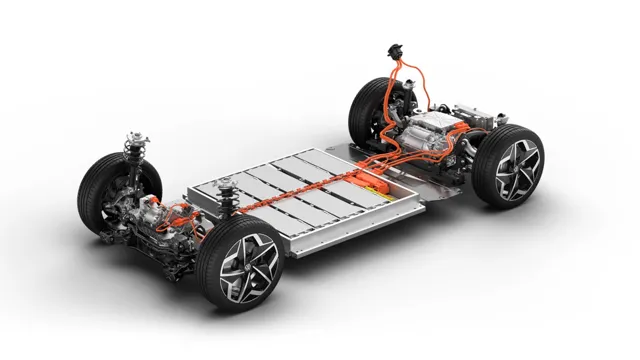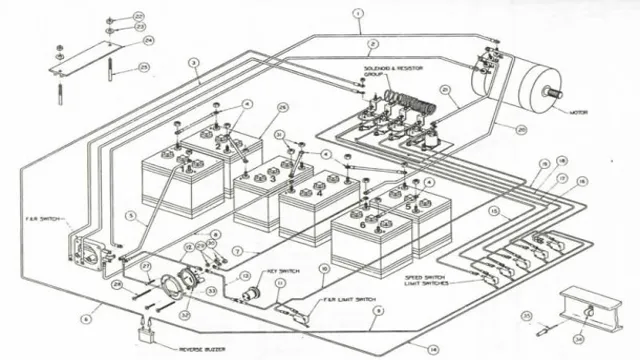The Shocking Truth About Battery Waste from Electric Cars: Solutions and Sustainability
Electric cars represent a greener way of transportation, reducing our carbon footprint and helping curb climate change. However, with greater adoption of this eco-friendly alternative come a new set of challenges. One of them is the growing waste problem that electric car batteries pose.
While electric cars have much fewer emissions during their lifetime, their batteries contain toxic chemicals such as lithium, cobalt, and nickel. These metals, when not disposed of correctly, can cause environmental pollution and harm to the ecosystem. This blog post will explore the impact of electric car batteries on the environment and how we can address the growing waste problem.
Current Battery Waste Statistics
Battery waste from electric cars is becoming an increasing concern in the current age of environmental awareness. According to a report by Bloomberg, by 2030, the need for electric vehicle batteries will outstrip the supply of raw materials needed to manufacture them, leading to a significant amount of battery waste. In addition, the batteries used in electric cars have a limited lifespan, typically around 10 years, after which they need to be replaced.
These expired batteries are a potential environmental hazard, releasing toxic chemical compounds into the environment if not correctly disposed of. Battery waste can, therefore, lead to long-term environmental damage and health risks for individuals. As people continue to shift towards electric cars, it is crucial that we come up with sustainable methods of recycling and disposing of their batteries to minimize the environmental impact.
Number of Electric Cars on the Road
Currently, the number of electric cars on the road is increasing at an impressive rate, especially in developed countries. However, with the gradual increase in the number of electric cars, there is also a concern about battery waste. According to recent reports, over 11 million tons of lithium-ion batteries are expected to be discarded globally by 2030.
This is raising questions about the environmental impact of the electric vehicle industry. The demand for raw materials, such as cobalt and lithium, used in battery production has led to unsustainable mining practices, often causing water scarcity and land degradation. In response to this growing concern, innovative solutions for recycling and reusing batteries are being explored by researchers and industry leaders.
If we can find ways to efficiently recycle batteries, we can reduce the environmental impact of the electric vehicle industry and secure a sustainable future for all.
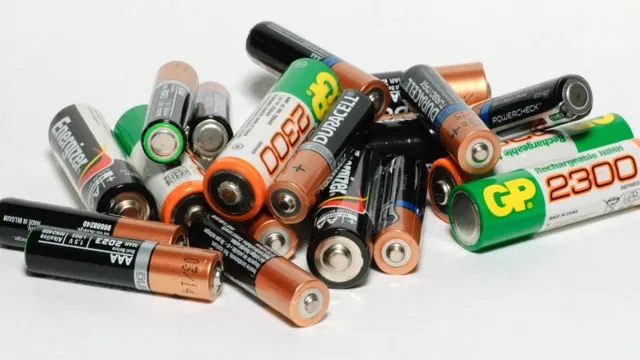
Projected Growth of Electric Cars
Projected Growth of Electric Cars As electric cars become increasingly popular and mainstream, there is a growing concern around the waste created from used batteries. Currently, the United States produces about 180,000 tons of battery waste each year, and that number is only projected to increase as the electric car market continues to grow. However, there is hope on the horizon as the demand for electric cars has spurred research into more sustainable and eco-friendly battery options.
Recyclable and biodegradable batteries are being developed, and programs are being implemented to properly dispose of used batteries. It is important for us to stay aware of this issue and consider our impact on the environment as we make the shift towards greener forms of transportation.
Percentage of Batteries Being Recycled
As the world becomes increasingly digital, the demand for batteries continues to rise. Unfortunately, the majority of these batteries end up in landfills, where they release toxic chemicals that harm the environment. In fact, only about 5% of batteries are currently being recycled globally.
This means that billions of batteries are piling up in landfills around the world, polluting our air and water. However, there is hope. With the increasing awareness of the importance of recycling and the development of new technologies, the percentage of batteries being recycled is slowly but surely increasing.
By properly disposing of your batteries and encouraging others to do the same, you can help reduce the amount of battery waste and protect our planet.
Why Battery Waste is a Concern
Battery waste from electric cars is becoming an increasing concern for environmentalists and governments around the world. While electric vehicles are a more sustainable transportation option than traditional gasoline-powered cars, the batteries used to power them have a limited lifespan. Once these batteries reach the end of their lives, they must be recycled or disposed of responsibly to prevent harm to the environment.
The issue lies in the fact that battery waste is not currently being handled properly at a global level, which leads to toxic chemicals and heavy metals leaching into the environment. These chemicals can have devastating effects on both human health and wildlife, making it essential to address the issue of battery waste from electric cars. By establishing effective battery recycling programs and promoting sustainable production methods, we can mitigate the negative impacts of battery waste and build a more sustainable future for ourselves and the planet.
Environmental Impact of Battery Waste
The environmental impact of battery waste is a growing concern for many people. When batteries are thrown away, they can end up in landfills and release toxic chemicals into the soil and water. These chemicals can seep into the ground, contaminate water sources, and harm wildlife.
Additionally, batteries can take a long time to decompose, which means that their negative impact can last for years. This is why it’s important to properly dispose of batteries and recycle them whenever possible. By doing so, we can help reduce the amount of waste that ends up in landfills and protect the environment for future generations.
So, next time you have a dead battery, consider recycling it rather than throwing it away. It may seem like a small action, but it can make a big difference in reducing the negative impact of battery waste on our planet.
Resource Depletion and Energy Waste
Battery waste is a growing concern in today’s world, and for good reason. With the increasing demand for technology and the shift towards renewable energy, the depletion of resources and excessive energy waste are major issues to address. Batteries play a crucial role in powering our portable devices, electric vehicles, and even renewable energy storage systems.
Unfortunately, these batteries don’t last forever and eventually need to be replaced or disposed of. This creates a significant amount of waste, and without proper recycling measures in place, it can lead to environmental and health hazards. It’s essential to recognize the impact of battery waste and take necessary steps towards sustainable practices, such as implementing more efficient recycling methods and designing batteries with longer lifespans.
By doing so, we can minimize resource depletion and ensure a cleaner, healthier planet for generations to come.
Solutions to Battery Waste
As more electric cars hit the road, the issue of battery waste from these vehicles is becoming a growing concern. However, there are several solutions in the works to combat this problem. One solution is implementing recycling programs for electric car batteries.
By recycling batteries, we can extract useful materials and reduce waste. Another solution is repurposing old electric car batteries for energy storage in homes or businesses. This way, the batteries are given a second life and can continue to provide value.
Furthermore, some companies are researching ways to make batteries more sustainable by using greener materials and designing them for easier recycling. While there is still much work to be done, these solutions offer hope for a more sustainable future.
Battery Recycling Processes
Battery waste is a highly relevant and pressing environmental issue that requires immediate attention. Fortunately, there are several battery recycling processes that can help alleviate the negative impact of waste on our planet. One of the most common processes involves hydrometallurgy, where the metals inside batteries are dissolved and separated, leaving behind reusable materials like plastics, electrolytes, and metal oxides.
Another process is called pyrometallurgy, which involves incineration of the battery cells in furnaces, followed by smelting of the resulting metal materials to create new products. Lithium Ion batteries, in particular, are often treated through reverse assembly. This involves mechanically shredding the battery cells and then using magnetic, gravity, and other technologies to sort the materials, with the resulting metals like cobalt, nickel, and lithium being re-purposed.
Despite the existence of these recycling mechanisms, the best solution to battery waste is still reduction and responsibly disposing of them in the first place. So, let’s remember to recycle our batteries and reduce our overall electronic waste footprint, for a cleaner, healthier planet.
Second Life Opportunities for Electric Car Batteries
Electric car batteries are an essential component of the growing electric vehicle market. Unfortunately, as these batteries near the end of their life, they become waste that needs to be disposed of safely. Fortunately, there are many opportunities to give these batteries a second life in Second Life, the virtual world.
With the increasing popularity of virtual simulations, electric car batteries can be reused in applications that require large energy storage capacities. Second Life provides a significant opportunity for battery companies to sell or lease these batteries for use in the virtual world. By doing so, they are also reducing waste, which is a win-win for both the company and the environment.
Recycled batteries can power Second Life game cars or serve as backup generators for essential services. In conclusion, a new era for electric car batteries is emerging, where environmentally friendly solutions are being created to manage battery waste.
Future Innovations to Reduce Battery Waste
Battery waste from electric cars is a growing issue that requires innovation for a sustainable solution. Future technologies such as solid-state batteries or battery recycling could greatly reduce the amount of waste from discarded batteries. Solid-state batteries, which use solid electrolytes instead of the liquid ones found in traditional batteries, have the potential to last longer and require less maintenance.
This could greatly decrease the number of batteries that need to be replaced and ultimately reduce waste. Additionally, advancements in battery recycling technology could increase the potential to reuse materials from old batteries. By extracting valuable materials such as cobalt and lithium, these materials can be repurposed for new batteries and products, reducing the need for raw materials.
As electric cars continue to grow in popularity, it is imperative that innovations are made to ensure a sustainable future for the industry.
Advances in Battery Design
As we seek to reduce the carbon footprint of various industries, one key area of focus is the development of more sustainable batteries. Innovations in battery design are paving the way for more efficient, longer-lasting batteries that produce less waste. One example of this is the use of solid-state batteries, which use a solid electrolyte instead of the conventional liquid one, improving battery lifespan and safety.
Another promising development is the use of recycled materials in battery production. For instance, researchers are exploring ways to extract metals like lithium from discarded batteries and reuse them in new ones. By embracing these advances in battery design, we can both reduce waste and advance the sustainable future we envision.
Exploring Alternative Power Sources
Battery Waste Reduction, Alternative Power Sources. As technology advances, alternative power sources have become a popular topic of discussion. The need to reduce battery waste has become a pressing issue as more and more electronic devices require batteries for energy.
One potential solution to this problem is the use of solar power. Solar-powered devices are becoming increasingly popular, as they utilize renewable energy from the sun, reducing the need for battery power. Additionally, researchers have been exploring the use of kinetic energy as a power source.
Kinetic energy is produced by movement, and devices that use this form of energy would generate power through everyday motions such as walking or shaking. Another promising innovation is the use of microbial fuel cells, which generate electricity from bacteria. These new developments hold promise for a future where battery waste is reduced through the use of alternative power sources.
Conclusion
In conclusion, while electric cars may be a greener alternative to traditional petrol-fueled vehicles, they are not without their environmental drawbacks. One of the biggest concerns is the disposal of the batteries once they reach the end of their lifespan. However, as we continue to innovate and develop more sustainable solutions, we can ensure that electric cars remain a viable option for reducing our carbon footprint and protecting our planet.
After all, when it comes to fighting climate change, every small step helps, even if it sometimes requires a big battery.”
FAQs
What is battery waste from electric cars?
Battery waste from electric cars is the discarded batteries from electric vehicles that can no longer hold a charge.
How are electric car batteries recycled?
The process of recycling electric car batteries involves extracting valuable metals such as lithium, cobalt, and nickel for reuse, while disposing of hazardous materials in a safe and environmentally-friendly manner.
Are electric car batteries harmful to the environment?
While electric car batteries are much less harmful to the environment than traditional gasoline-powered cars, they still have the potential to cause pollution if not disposed of properly. Recycling is crucial to minimize the environmental impact of battery waste.
Can electric car batteries be reused?
Yes, electric car batteries can be repurposed for other energy storage solutions such as for homes or businesses, or as backup power sources for electric vehicles. This extends the lifespan of the batteries and reduces the amount of waste generated.


